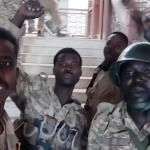The scenes of jubilant soldiers in Khartoum mark a significant advance in an offensive that has seen Sudan’s army seize back swathes of territory in recent months.
The Sudanese Armed Forces (SAF) lost control of the capital early in the war and have been fighting for two years to recapture it from the paramilitary Rapid Support Forces (RSF).
Now they have retaken the presidential palace and believe they are on course to win back the rest of the capital. But they are a long way from winning the war.
The complex, which includes the historic Republican Palace, is a symbol of power and sovereignty, important for the military-led government and its narrative as legitimate rulers fighting a “terrorist militia.”
This is also a strategic victory.
After clearing outer districts of greater Khartoum, the army has taken much of the city centre, pushing the RSF fighters out of key sites like government buildings and away from the military’s General Headquarters, according to an army spokesman.
This means the RSF has in effect lost its control of the capital, even though its fighters are still present in Khartoum.
But it is not clear how far the frontline has moved. RSF fighters are still scattered around the city centre and stationed in part of the airport. They also occupy territory to the south of the palace.
Bloody fighting is expected to continue as the army tries to corner remaining RSF units. The paramilitary force has already shown it can strike back despite its weakened position, launching a drone attack at the palace that killed a number of Sudanese journalists and army officers.
A full army victory in the capital could reset the direction of the war or harden the territorial division that divides the country between the two foes.
The RSF, led by General Mohamed Hamdan Dagalo, known as Hemedti, controls most of the Darfur region in western Sudan, and parts of the south.
The military-backed government, led by army chief General Abdel Fattah al-Burhan, controls eastern and northern Sudan.
The two men worked together, and carried out a coup together, before a power struggle between them exploded into civil war in April 2023.
Full control of Khartoum could help the army complete its takeover of central Sudan, where it has wrested back territory from the RSF in recent months.
It may also create momentum for the SAF to challenge General Hemedti in his stronghold of Darfur, especially over the city of El Fasher, which has been under RSF siege for nearly a year.
But many observers believe there is a danger that Sudan will drift into de-facto partition, with the two warring parties and their backers entrenching themselves in their zones of influence.
The RSF is working to set up a parallel government in areas it controls, gathering allied groups to sign a political charter and constitution last month in Nairobi.
Its intention was to show that despite battlefield setbacks, it remains a potent force – and that its desire to take control of the country remains undimmed.

Sudan’s people have borne the brunt of this brutal civil war, which has inflicted massive death, destruction, and human rights violations on civilians.
The United Nations has described the situation in the country as the world’s worst humanitarian crisis. More than 12 million people have been forced to flee their homes and millions face acute food shortages, with parts of the country driven into famine.
Khartoum is one of the places expected to reach famine conditions soon, having been subject to widespread looting from RSF soldiers and restrictions on aid by the Sudanese government. So a change of power in the city could make a big difference to humanitarian conditions there.
But for most of the people of Sudan it means that for now little is likely to change.
Both sides have been accused of obstructing emergency aid, in effect using it as a weapon of war, according to UN officials. And both have been accused of war crimes, although critics have singled out the RSF for charges of mass rape and genocide.
The army will be hoping that reclaiming the Presidential Palace proves to be a staging post for a broader ultimate military victory.
But although the SAF have momentum, it is unlikely that either party can achieve a victory which allows them to govern the whole of Sudan, the International Crisis Group said in a recent report.
Still, both sides have vowed to continue fighting for the remainder of the country, and efforts to revive peace talks so far have failed.














